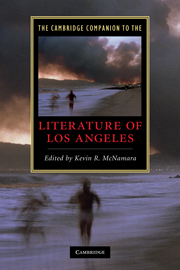Book contents
- Frontmatter
- Introduction: landmarks
- 1 The literature of the Californios
- 2 The Anglo invention of Los Angeles
- 3 LA fiction through mid-century
- 4 British expatriates and German exiles in 1930s-1940s Los Angeles
- 5 Postwar Los Angeles: suburban Eden and the fall into history
- 6 Los Angeles and the African-American literary imagination
- 7 Pacific Rim city: Asian-American and Latino literature
- 8 The literature of urban rebellion
- 9 City of sleuths
- 10 Los Angeles’ science fiction futures
- 11 Hollywood fictions
- 12 The Southland on screen
- 13 Scenes and movements in Southern California poetry
- 14 Surf, sagebrush, and cement rivers: Reimagining nature in Los Angeles
- 15 Essaying Los Angeles
- Guide to further reading
- Index
13 - Scenes and movements in Southern California poetry
Published online by Cambridge University Press: 28 May 2010
- Frontmatter
- Introduction: landmarks
- 1 The literature of the Californios
- 2 The Anglo invention of Los Angeles
- 3 LA fiction through mid-century
- 4 British expatriates and German exiles in 1930s-1940s Los Angeles
- 5 Postwar Los Angeles: suburban Eden and the fall into history
- 6 Los Angeles and the African-American literary imagination
- 7 Pacific Rim city: Asian-American and Latino literature
- 8 The literature of urban rebellion
- 9 City of sleuths
- 10 Los Angeles’ science fiction futures
- 11 Hollywood fictions
- 12 The Southland on screen
- 13 Scenes and movements in Southern California poetry
- 14 Surf, sagebrush, and cement rivers: Reimagining nature in Los Angeles
- 15 Essaying Los Angeles
- Guide to further reading
- Index
Summary
Critical accounts of American poetry all too frequently privilege San Francisco, Berkeley, and Oakland, overlapping sites that evoke West Coast poetry's most memorable events and movements: the Berkeley Renaissance, the San Francisco Beat scene, and most recently, Language writing. Yet the outsider impetus behind William Everson's observation that the West Coast canon prizes creativity, and the East Coast canon judgment, applies equally to Los Angeles, although the fractal energy of the city's poetry scenes is less easily mapped out. While surveys of fiction probably work best by focusing on individual authors, the development of American poetry for much of the past half century is intimately linked to communities of writers and publishers. The viability of the network of workshops, public readings, magazines, and presses in 1970s and 1980s Los Angeles, for instance, depended on the availability of production facilities such as New Comp Graphics at Beyond Baroque, in the beachfront city of Venice, to help poets demarcate their communities in a self-reflective, organic manner. Fervently embracing the antinomian tendency in American poetry first enunciated by Roy Harvey Pearce, these intersecting communities and coteries produced poetry far exceeding in quantity and quality the writing produced about Los Angeles in the form of occasional poems by temporary residents or those living at a bemused distance. This survey will therefore focus on the scenes and communities that have flourished and intermingled in Los Angeles since World War II.
- Type
- Chapter
- Information
- The Cambridge Companion to the Literature of Los Angeles , pp. 157 - 166Publisher: Cambridge University PressPrint publication year: 2010

